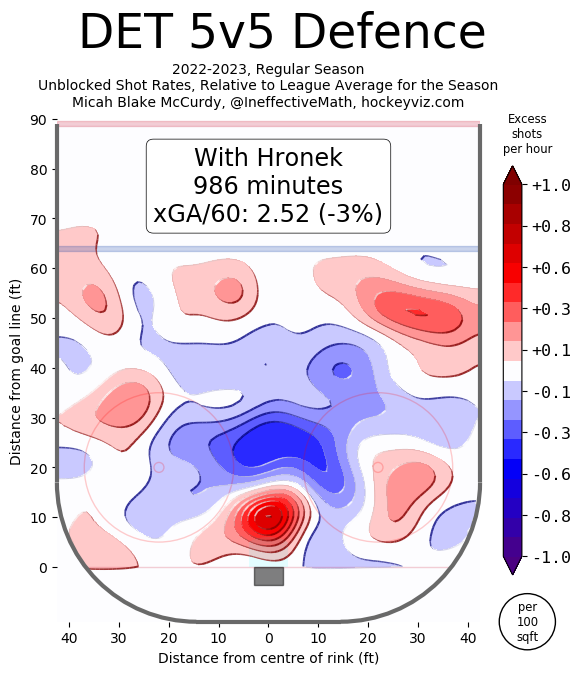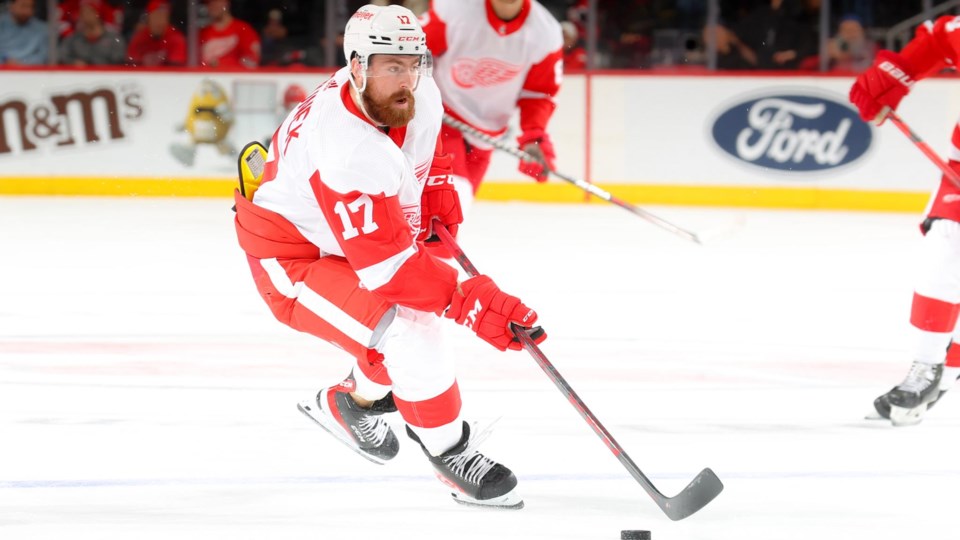"The trades that we make is trying to get players 26, 25 years or younger and bring this team together within the next year or two."
That was Vancouver Canucks president of hockey operations Jim Rutherford in mid-January, talking about how his preference at the NHL's trade deadline would be to acquire NHL players rather than draft picks, in hopes of turning the team around within a two-year timeframe instead of more slowly building up the team through the draft.
The Canucks' initial work on the trade market, however, suggested that they might be looking further into the future than they initially suggested. They acquired picks and prospects by trading away Bo Horvat, Luke Schenn, Riley Stillman, and Will Lockwood, giving them seven picks in the first four rounds of the 2023 NHL Entry Draft.
The most intriguing trade return of the bunch was the first-round pick acquired from the New York Islanders in the Horvat deal. The pick has conditions: if the Islanders miss the playoffs and get a top-12 pick in the 2023 draft, the pick rolls over to 2024 and will be unprotected. It was a fascinating gamble on the part of Canucks general manager Patrik Allvin, betting that the Islanders' pick would be better than any other pick they could get for Horvat.
Now the pick belongs to the Detroit Red Wings.
"We are happy to continue to add younger pieces."
The Canucks traded the Islanders' first-round pick, as well as their own second-round pick in 2023, to the Red Wings for right-shot defenceman Filip Hronek and a fourth-round pick in 2023.
"We are excited to add a 25-year-old right-shot defenceman who handles the puck well and possesses a strong two-way game," said Allvin in a press release. "He has steadily progressed throughout his time in Detroit to show that he is a top pairing defenceman in this league. We are happy to continue to add younger pieces to build out the core of this team."
Hronek certainly fits a need for the Canucks on the right side, which is the team's biggest weakness on their roster. But it wasn't cheap to do so, as the Canucks traded what is likely to be two top-40 picks for Hronek.
Is this the right time for the Canucks to trade top draft picks?
Setting Hronek aside for a moment, one has to question whether a team that is currently 27th in the NHL and en route to missing the playoffs for the seventh time in the last eight years should be trading away first and second-round picks. Canucks fans have seen the team trade away first-round picks for J.T. Miller, Conor Garland, and Oliver Ekman-Larsson in recent years and it hasn't helped.
Then there are the multiple second-round picks they've traded, including one in the deal for Garland and Ekman-Larsson, and others in deals for Tyler Toffoli, Erik Gudbranson, Brandon Sutter, Sven Baertschi, and Linden Vey.
The bleeding of draft capital during Jim Benning's tenure as general manager led to the Canucks currently having one of the worst prospect pools in the NHL. As a result, there has been no second wave of young talent to support the young core of Elias Pettersson, Quinn Hughes, and Thatcher Demko. Instead, the Canucks have overspent on mediocre veterans for the middle of their lineup, clogging up their cap space and leaving them unable to improve from their mediocre state.
It's not that Hronek is a bad player to target, it's that this isn't the time for the Canucks to be pursuing players in their mid-twenties in hopes of a quick turnaround. It's exactly what the Canucks did under Benning: Erik Gudbranson was also 25 when the Canucks traded for him.
Canucks management has repeatedly warned that rebuilds take time; retools can take a lot longer, leaving a team perpetually treading water and making no progress.
Hronek will make the Canucks better
Let's be clear: Filip Hronek is a good defenceman.
Hronek can carry the puck in transition, has a strong shot and can move the puck well in the offensive zone, and has been excellent on the penalty kill in a secondary role for the Red Wings. He also contributes on the other side of special teams, playing on the second power play unit, where he's tallied 16 of his 38 points this season.
While he's been behind Moritz Seider on the right side of the Red Wings' defence, he's played top-pairing minutes, averaging 21:32 in ice time per game in all situations. He hasn't faced the toughest competition, however, with those minutes generally going to the pairing of Jake Walman and Moritz Seider.
That's because Hronek still has some defensive warts to his game at even strength. While he's able to limit shots against and protects the slot well, he struggles around his own net when it comes to boxing out and preventing opponents from getting to rebounds.

Still, with a likely spot alongside Quinn Hughes on the top pairing, Hronek should thrive. In theory, the two puck-moving defencemen won't allow the puck to stay in their own end of the ice long enough for their defensive game to matter all that much.
Aside from his defensive game, Hronek immediately becomes the second-highest scoring defenceman on the Canucks and he should theoretically make the second power play unit more dangerous. For a team that has struggled to transition out of their own zone, Hronek should make the Canucks a better team.
Hronek is currently out with an upper-body injury
He might not make them better immediately, however, as he's currently out with an upper-body injury. For a Canucks team that needs to finish as low in the standings as possible to get the best possible first-round draft pick — especially now that they only have one — that's arguably a positive.
Next season, however, Hronek should improve the Canucks. At only a $4.4 million cap hit, Hronek is also reasonably priced for a top-four defenceman. For now.
Hronek has just one more year on his current contract, after which he'll be a restricted free agent in need of a new contract. If Hronek is the top-pairing defenceman that Allvin envisions, how much will his next contract cost?
Again, this gets back to the timing of the deal. One of the reasons why a strong prospect pool is so important in the salary cap era is that teams need impact players on cheap entry-level and second contracts in order to avoid a cap pinch. Teams have to spend big on their star players, then be as frugal as possible with the rest of their lineup. The easiest way to be frugal is by developing from within.
The risk with Hronek is not that he's a bad defenceman. The risk is that even if he's good, it's not enough to make the Canucks a Stanley Cup contender. It's the risk that the Canucks will once again be pressed up against the salary cap in a few year's time while still sitting in the middle of the NHL standings, struggling to make the playoffs on the bubble.




